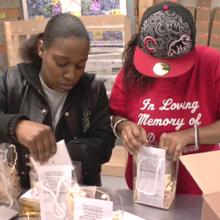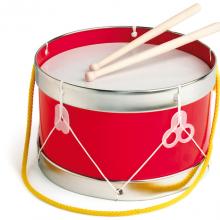Christmas
Editor's Note: New Vision Renewable Energy connects Christians with opportunities to provide renewable solar lights to people in the developing world. Their Christmas Lights Advent Devotional features daily readings and questions from prominent Christian thinkers, including Sojourners president Jim Wallis. This Day 10 of Advent devotional from Jim Wallis is reprinted and adapted with permission of New Vision Renewable Energy. You can find the full Christmas Lights Advent Devotional guide and solar light kits here: http://nvre.org/devotional-order.html
Proclaiming Jesus as light of the world is an audacious statement. It directly challenges all those idols that persistently attempt to replace God as the center of our lives and our world. In our culture, a selfishness that denies any obligation to anyone or anything beyond our own self-interest may be the greatest idol of all. It denies that demanding more and more energy at great cost to our environment and the people who live close to the land has problematic consequences. We have lost sight of the common good and the consequences have been devastating.
In many places, hope has turned into despair. Darkness seems to be crowding out light. From where will our help come from?
I’d say the moment is ripe for “Christ in Christmas” — the real Christ, of course, who shunned the privileged and aligned himself with sinners and outcasts, whose heart went out to sufferers like the homeless of Rome whom a new pope risks serving.
I’d say the moment is ripe for new life being born in stables and forced to flee the powerful and greedy. We have seen Mammon’s insatiable maw, power’s absolute corruption of the human soul, and thugs murdering the many in order to protect the few — and we know our need of something better.
So, yes, it’s time for Christ in Christmas. Time for new life, time for hope, time for the faithful to say yes to God. Time for peace, not war. Time for repentance, not comfort at any cost. Time for justice and mercy and the even-handed goodness that God promised.
This, of course, isn’t what zealots mean when they vow to “defend” the faith from a culture’s “war on Christmas.” They want a free-fire zone where moralizers can denounce all but the like-minded, and churches with huge budgets can frighten or seduce worshippers into donor mode. They mean using Jesus’ name to impose the very cultural and political oppression that Jesus escaped once as a child but couldn’t escape as an adult.
What makes one a good person? Additionally, what makes one a good Christian? I have been spending some time wondering about this as news of Mandela’s death has been making it’s way across the planet. Was he a good man? I think so, but how do we measure that? How do we know? And if, as some have claimed, his greatness stemmed from his willing embodiment of his Christian faith, I need to know if he was a good Christian.
Guy Sorman writes of Mandela:
“The Commission for Truth and Reconciliation, founded by President Mandela and led by Bishop Tutu, is perhaps the most concrete example of Mandela’s Christian faith. Instead of the vengeance and reprisals that were expected and feared after years of interracial violence, the commission focused on confession and forgiveness. Most of those who admitted misdeeds and even crimes — whether committed in the name of or in opposition to apartheid — received amnesty. Many returned to civil life, exonerated by their admission of guilt.”
Mandela is exemplary not because he was perfect, always kind to everyone he met, an ideal husband and father, but because of these larger virtues that he also attempted to live out. He lived into these virtues — all of them, large and small, and all of them incompletely.
When I was 4 and 5 years old, my parents hung our stockings up at the beginning of Advent. Each morning, my younger sister and I would run down to the rec room to see if Santa had left us anything during the night. Finding an empty stocking was a huge relief, because the only reason Santa would leave us anything before Christmas was if we had been bad. Bad children would get a warning, you see. An onion or turnip swelling the stocking’s toe meant we were on probation and we had better shape up before Christmas or we’d end up on the naughty list.
This put the fear of God, er, Santa in me, I can tell you! When it happened to me (and it happened a lot — I reigned over my younger sister with the zeal of a tyrant!), I would rack my brain to figure out what I had done the day before that had garnered Santa’s judgment. Sometimes I knew what it was and I’d apologize for it and promise to do better, but sometimes I didn’t know what I’d done wrong and that was the worst of all. How can you fix something when you don’t quite know what needs fixing? I would worry and fret until Christmas morning. My stocking filled with candy and the presents under the tree were a relief, tangible evidence that in Santa’s estimation, I was a good girl. At least good enough to stay off the naughty list!
And so it begins: “The Reason for the Season.”The bumper stickers and fridge magnets are flooding my mail box and being slapped into my hands kindly by ushers. Church signs from all denominations proclaim: “Jesus is the Reason for the Season!”The phrase has become ubiquitous.
But for me, it’s like nails-on-chalkboard. Indeed, he is the reason. Though we should probably draw our camera back for the wider view on the reason: God’s love (for he so loved the world … well, you know the rest). It is not the accuracy of the slogan that makes me cringe (because it is accurate), but rather, because it’s fluff. It is the religious equivalent to sappy pop music.
“Let’s keep Christ in Christmas!”
“Jesus: the gift that keeps on giving!”
Given the magnitude of Christ’s birth, are these slogans the best we can do?
Brace yourselves. The calendar has turned over to December, which means that the inevitable discussion on the “War on Christmas” will soon see it’s opening salvo for 2013.
It is inevitable. There will be an outrage by a prominent figure about how we have lost our moral fabric because as someone was buying gifts with money they don’t have to impress people that they don’t always like, the cashier will commit the unthinkable sin of wishing us a “Happy Holidays” instead of “Merry Christmas.”
There will be gnashing of teeth as a town or city somewhere will have a “Holiday Parade” rather than a “Christmas Parade,” as Tulsa had done several years ago. (The parade was subsequently boycotted by one of it’s senators.)
The chorus of those who would profess to be Christians will shout that the “Political Correctness Police” have overstepped yet another boundary and that we should not take the “Christ out of Christmas” as the batch of perceived slights against Christendom freshly reveal themselves for this holiday season.
As a person who would say that Jesus is the most important thing in my life, who has devoted my life to the service of God’s Kingdom, and spends all of my waking moments trying be faithful to that devotion, I have to ask: “What exactly do we mean by putting the ‘Christ back in Christmas'?”
This is Giving Tuesday, when nonprofits of every stripe hope to attract some of the billions of dollars to be spent during the Hanukkah and Christmas season.
Many of those dollars will go to religious groups. Now, new research is expanding the meaning of “religious giving.” It counts motivation for giving, and measures not only gifts to houses of worship but also donations to faith-connected nonprofits that are doing secular service such as fighting poverty or offering job training for the disabled.
“Most people cite their religious commitments, but most also cite the belief that they should give to benefit others. Many people hold both these impulses at the same time,” said Shawn Landres, a co-author of the research report, “Connected to Give: Faith Communities.”
I always had very mixed feelings about Christmas as a kid. My dad — not a religious guy — went all out for this holiday, in the typical secular ways. He bought so many presents that it would end up being hard to make our way through the dining room, where we put the tree. We’d spend at least two weekends in November hanging lights and other swag outside, and the house resonated with Bing Crosby, Dean Marin and John Denver, all wishing us merry Christmas, over and over again.
I came to hate decorating the house. All of that time spent on the roof could have been much better used playing with my friends and, of course, I never hung the lights correctly. I’d flop them along the wrong side of the roofline, only to be sent back to make it right. And suffice it to say that, although I love the Rat Pack singers in particular, hearing any carol more than 43 times in the course of three weeks can sour even the most ardent fans.
Then there was the matter of the gifts. As I said, the piles of boxes were fairly obscene, which actually proved an embarrassment if we had other family visiting for Christmas. I was not a fan of being the center of attention, and opening my remaining presents while jealous cousins looked on made me just want to get it over and done with.
A predominant message of this holiday season seems to be both loud and clear: Our value as human beings is often dictated by our capacity to consume.
While the average North American consumes approximately twice as much as 50 years ago, we are significantly less satisfied with the quality of our lives, which is — of course — contrary to the mass “this stuff will make you happy” messages we receive on countless occasions each day. Nevertheless, we continue to embrace a culture of consumerism, for we consume at staggering rates, not only in an attempt to make right our perceived wrongs, but also because we are led to believe that such devotion contributes to the wellbeing of society. As Victor Lebow states, “Our enormously productive economy ... demands that we make consumption our way of life, that we convert the buying and use of goods into rituals, that we seek our spiritual satisfaction, our ego satisfaction, in consumption ... we need things consumed, burned up, replaced and discarded at an ever-accelerating rate.” According to the most vocalized narratives that affect contemporary life, to be a human of significant value in North America — especially during the month of December — is to be a committed and consistent consumer, even if it leads to our personal and public self-destruction.
Much of our imagery of Advent is tied into the idea of waiting. Waiting for Emmanuel to come. Waiting for God to intervene. We’re in the middle of the night waiting for dawn to arrive. We’re waiting for something different to happen. One image is the pregnant woman waiting to give birth, which ties into the nativity story.
We spend a lot of our lives waiting for various things. Maybe the question for Advent is: What are we waiting for? And when does the waiting end?
So much of our religion has become about waiting. Waiting for heaven. Waiting for God to respond to a prayer and to change something. Waiting for God to right the wrongs. Waiting for God to set things straight. Waiting and waiting and waiting.
What if we’ve got it backward? What if someone is waiting for us?
There is an awesome moment in the opening chapter of the book of Luke where the writer frames his gospel as an epic celestial battle taking place in the heavenly realm: This is the story of the reign of men vs. the reign of God.
Luke makes it clear. What happened in these pages began in the days of King Herod of Judea (Luke 1:5). King Herod was a product and protector of empire. His father was appointed procurator of Judea by Julius Caesar. He subsequently appointed Herod military prefect of Galilee. After the death of Julius, Antony, and Octavian, Augustus Caesar favored Herod and gave him the name "king of the Jews," eventually becoming governor of Judea.
Herod was most concerned with maintaining his power — at all costs. He built the Roman Empire at his own people's expense. He built great monuments and structures, including the reconstruction of the Jerusalem Temple, enslaving his own people to do it. He used the Jews' labor to erect temples to pagan deities, and, paranoid of anyone who might usurp his power, Herod schemed against his own family, executing three of his own sons for insurrection — one only a few days before his death.
Enter a priest named Zechariah and his wife, Elizabeth.
It's started.
I was following the Twitter feed for the conversation between Nadia Bolz-Weber and Amy Butler at Calvary Baptist Church in Washington, D.C. (#nadiaandamy) about the present realities and possible futures of Christianity in the United States, and it happened. I was happily dividing my cognitive attentions between Twitter and the television when it happened.
There was a Christmas ad.
Invest in the transformation of lives by trying some of these fair trade, eco-friendly gift ideas or charities.
DESPITE THE heart-felt and hand-written requests from thousands of American children in their Christmas letters, Santa has just announced he cannot bring them a new Congress this year. He tried, Santa wants us all to know; he tried hard. But he and his elves finally gave up when even the parts imported from China couldn’t make the thing work.
They first attempted to construct something with U.S.-made components, but it was almost as if the parts didn’t want to work together, like they had minds of their own. This surprised the elves since Congress—which has no apparent moving parts—hasn’t had a sentient thought in years.
However, as a small concession to all those disappointed little children, Santa this year will be honoring Christmas wishes that have traditionally been difficult to fulfill.
If Sally from Shreveport can’t get a workable electoral body in the nation’s capital, then she gets a pony. Simple as that. She asked for it last year—in fact she’s been asking for a long time—but this year she’ll get it. If her parents are not sure what to do with a 600-pound animal that requires constant attention and care, then maybe next time they’ll think twice before voting for a member of Congress who wears a three-cornered hat and proudly refuses to be treaded on, even though nobody’s trying.
CHRISTMAS, ON THE surface, looks like the most wonderful time of year—the season of love, lights, carols, candles, and family reunions, the time when Christians celebrate the birth of Jesus Christ. Look a bit deeper, though, and one might notice a more idolatrous narrative shining just as brightly: consumerism.
From Black Friday to New Year’s Day, we are inundated with the commercial demands of Christmas. For many, the list of things to do and gifts to purchase can seem endless. We buy into the mantra that the more money we spend, the more love we convey. We become lost in crowded stores, endless websites, and credit card debt. Christians often struggle to faithfully observe Advent, a time of waiting and preparation for the miraculous birth of Jesus.
While many of us purchase this spurious version of Christmas, a new movement has been born. It’s called Advent Conspiracy (AC), and its participants are seeking to turn Christmas upside down by exchanging consumption for compassion.
“Advent Conspiracy is not a four-point checklist on how to do Christmas. If anything, it’s a chance for us to rediscover the wonder and the mystery of the incarnation and what that means to us personally and what that might mean for the world,” said Greg Holder, lead pastor of The Crossing church in the St. Louis area.
Sarah Palin is writing another book. This one focuses on putting faith and values back into Christmas.
The former GOP vice presidential candidate is writing, “A Happy Holiday IS a Merry Christmas,” in which she will focus on Christian values and criticize the “over-commercialism” and “homogenization” that have come to define Christmas. The Associated Press says the book will come out in November.
When asked to identify common features of the historical Christmas storyline, many speak of Mary, Joseph, shepherds, wise men, angels, King Herod, and of course, the newborn Jesus. But we too often fail to recognize the social circumstances in which Jesus was born; our understanding of the nativity narrative is too often left incomplete.
In the midst of our various congregational and community Christmas celebrations, we are confronted with the harsh reality that Jesus was brought into the world within a condition of homelessness. As a result, one can argue that we cannot fully commemorate Christmas without recognizing its social setting, for the context of Jesus’ birth points us toward the content and concerns of Jesus’ life.
What does the birth of the baby Jesus 2,000 years ago have to offer the violent, troubled world we live in? Or what would Jesus say to the NRA?
I want to suggest — a lot. A whole lot.
Jesus entered the world from a posture of absolute vulnerability — as an unarmed, innocent child during a time of tremendous violence. The Bible speaks of a terrible massacre as Jesus was born, an unspeakable act of violence as King Herod slaughters children throughout the land hoping to kill Jesus (which the church remembers annually as the massacre of the Holy Innocents).
Perhaps the original Christmas was marked more with agony and grief like that in Connecticut than with the glitz and glamour of the shopping malls and Christmas parades. For just as Mary and Joseph celebrated their newborn baby, there were plenty of other moms and dads in utter agony because their kids had just been killed.
From his birth in the manger as a homeless refugee until his brutal execution on the Roman cross, Jesus was very familiar with violence. Emmanuel means “God with us.” Jesus’s coming to earth is all about a God who leaves the comfort of heaven to join the suffering on earth. The fact that Christians throughout the world regularly identify with a victim of violence — and a nonviolent, grace-filled, forgiving victim — is perhaps one of the most fundamentally life-altering and world-changing assumptions of the Christian faith. Or it should be.
So what does that have to do with the NRA? Underneath the rhetoric of the gun-control debate this Christmas is a nagging question: are more guns the solution to our gun problem?
Some of my environmentally conscious friends have expressed concern about having a real Christmas tree in their house – it seems wasteful to cut down an entire tree just for a month or so of décor. After all, climate change is a huge problem, and its potential impacts on the world (most especially the poor) seem contrary to the Christmas spirit.
It’s not a new worry – Teddy Roosevelt actually banned the White House Christmas Tree during his time in office, as he was worried about the conservation implications of people running out to cut down the forest.
We can rest easy, though – the live Christmas tree industry that has developed since that time is actually a benefit to the global climate. Here’s why.
“The Little Drummer Boy” tells a wonderful short story of a poor boy who feels he has no gift to give to the baby Jesus. In spite of his lack of gifts, he offers to play his drum for him, to the delight of all in the stable, especially baby Jesus, who smiles at the drummer boy.
Not only is this song fun to sing with its drum-like “pa-rum-pum-pum-pums,” but also it embraces a non-materialistic message that we all need to hear, especially this time of year. In a society of hyper-commercialized Christmas, where we are bombarded with advertisements filled with the pressure to find the perfect gift, “The Little Drummer Boy” challenges this societal expectation. Perhaps the perfect gift is really just ourselves, being who we are, bringing our own gifts and talents to each other and to a world in deep need of healing.
While the boy is poor and feels like he has nothing to offer, he has a drum and plays for those gathered at the stable — and they are pleased. While our society pressures us to perform, to prove our love and appreciation for someone, it is actually the simple sharing of life, being together with family and friends around good food and drink — and maybe even dance and sing (with a drum!) — that is what we truly need or want around Christmas time. I know this is true for me.

















